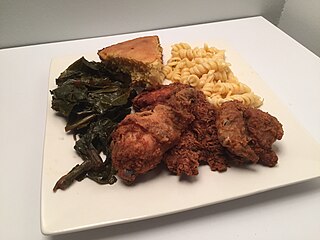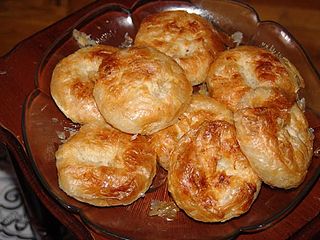
American cuisine consists of the cooking style and traditional dishes prepared in the United States. It has been significantly influenced by Europeans, Indigenous Americans, Africans, Latin Americans, Asians, Pacific Islanders, and many other cultures and traditions. Principal influences on American cuisine are European, Native American, soul food, regional heritages including Cajun, Louisiana Creole, Pennsylvania Dutch, Mormon foodways, Texan, Tex-Mex, New Mexican, and Tlingit, and the cuisines of immigrant groups such as Chinese American, Turkish American, Italian American, Jewish American, and Mexican American. The large size of America and its long history of immigration have created an especially diverse cuisine that varies by region.

Soul food is the ethnic cuisine of African Americans. Originating in the American South from the cuisines of enslaved Africans transported from Africa through the Atlantic slave trade, soul food is closely associated with the cuisine of the Southern United States. The expression "soul food" originated in the mid-1960s when "soul" was a common word used to describe African-American culture. Soul food uses cooking techniques and ingredients from West African, Central African, Western European, and Indigenous cuisine of the Americas.

The cuisine of the Southern United States encompasses diverse food traditions of several subregions, including cuisine of Southeastern Native American tribes, Tidewater, Appalachian, Ozarks, Lowcountry, Cajun, Creole, African American cuisine and Floribbean, Spanish, French, British, and German cuisine. In recent history, elements of Southern cuisine have spread to other parts of the United States, influencing other types of American cuisine.

A tagine or tajine, also tajin or tagin is a Maghrebi dish, and also the earthenware pot in which it is cooked. It is also called maraq or marqa.

Paula Ann Hiers Deen is an American chef, cookbook author, and TV personality. Deen resides in Savannah, Georgia, where she owns and operates The Lady & Sons restaurant with her sons, Jamie and Bobby Deen. She has published fifteen cookbooks.
African cuisine is an integral part of the continent's diverse cultures reflecting its long and complex history. The evolution of African cuisine is closely entwined with the lives of the native people, influenced by their religious practices, climate and local agriculture. Early African societies were largely composed of hunter-gatherers who relied on foraging for wild fruits, vegetables, nuts, and hunting animals for sustenance. As agriculture developed across the continent, there was a gradual shift to a more settled lifestyle with the cultivation of crops such as millet, sorghum, and later maize. Agriculture also brought about a change in diet, leading to the development of a variety of culinary traditions which vary by religion. Many African traditional dishes are based on plant- and seed-based diets.
Paula's Home Cooking is a Food Network show hosted by Paula Deen. Deen's primary culinary focus was Southern cuisine and familiar comfort food popular with Americans. Over 135 episodes of the series aired between 2002 and 2012. Food Network announced in 2013 that it would not be renewing Deen's contract.
James Linton Deen Jr. is an American cook, restaurateur, and TV personality.
Robert Earl Deen is an American television chef, TV personality, and restaurant manager.

A food museum tells the story of what sustains humankind. These museums are located all around the world, and spotlight various varieties and origins of certain foods. Such museums may be specifically focused on one plant, as is the Saffron Museum in Boynes, France. They may also explore foods made from plants. For example, The Bread Museum in Ulm, Germany, South Korea; a product such as the National Mustard Museum in Wisconsin, Big Mac Museum in Pennsylvania, Museum Kimchikan in South Korea, Cup Noodles Museum in Yokohama; the art of food displayed at California's Copia; food heritage showcased at Sichuan Cuisine Museum in Chengdu; or historic farms, for example, Iowa's Living History Farms, feature broader exhibits on art, history, and influence of food production.

Paula's Party is a show on the Food Network hosted by Paula Deen. Unlike her other show on the Food Network, Paula's Home Cooking, Paula's Party was originally taped in front of a small audience at Uncle Bubba's Oyster House in Savannah, Georgia, and Deen herself frequently interacts with audience members. In 2008, taping of the show moved from Savannah to Food Network studios in New York City.

Sephardic Jewish cuisine, belonging to the Sephardic Jews—descendants of the Jewish population of the Iberian Peninsula until their expulsion in 1492—encompassing traditional dishes developed as they resettled in the Ottoman Empire, North Africa, and the Mediterranean, including Jewish communities in Turkey, Greece, Bulgaria, North Macedonia, and Syria, as well as the Sephardic community in the Land of Israel. It may also refer to the culinary traditions of the Western Sephardim, who settled in Holland, England, and from these places elsewhere. The cuisine of Jerusalem, in particular, is considered predominantly Sephardic.
In social science, foodways are the cultural, social, and economic practices relating to the production and consumption of food. Foodways often refers to the intersection of food in culture, traditions, and history.
Marcel Desaulniers was an American chef who was part-owner of the Trellis Restaurant in Williamsburg, Virginia, a cookbook author, director Emeritus of the Culinary Institute of America, and self-described "Guru of Ganache". He is the author of the 1992 book Death by Chocolate.

Mary Randolph was a Southern American cook and author, known for writing The Virginia House-Wife; Or, Methodical Cook (1824), one of the most influential housekeeping and cook books of the 19th century. Many of the recipes used local Virginia ingredients including Tanacetum vulgare virginia pudding, pickled nasturtiums and desserts with the native gooseberry. She was the first person known to be buried at what would become known as Arlington National Cemetery.
Paula's Best Dishes is an American cooking show hosted by Paula Deen on Food Network

Okra or Okro soup is primarily associated with the Igbo tribe of Nigeria and is prepared using the edible green seed pods of the okra flowering plant as a primary ingredient. Other vegetables can be added to the soup as well, such as ewedu, kerenkere, or Ugu leaf. Depending on the specific variant being prepared, okra soup can have a clear broth or be deep green in colour, much like the okra plant itself. Okra can have a slippery or "slimy" mouthfeel. The edible green seed pods can also be used in other stews and soups, such as the American dish gumbo.

The Cooking Gene: A Journey Through African American Culinary History in the Old South is an American non-fiction book written by Michael W. Twitty. It was published in 2017 and is a food memoir. The author combines intensive genealogical and historical research as well as personal accounts to support the argument that the origin of southern cuisine is heavily based in the continent of Africa. The book was the recipient of the 2018 James Beard Foundation Book Award for Writing and Book of the Year.

Lena Richard was a chef, cookbook author, restaurateur, frozen food entrepreneur, and television host from New Orleans, Louisiana. In 1949, Richard became the first Black woman to host her own television cooking show. Her show aired from October 1949 - November 1950 on local television station WDSU.











